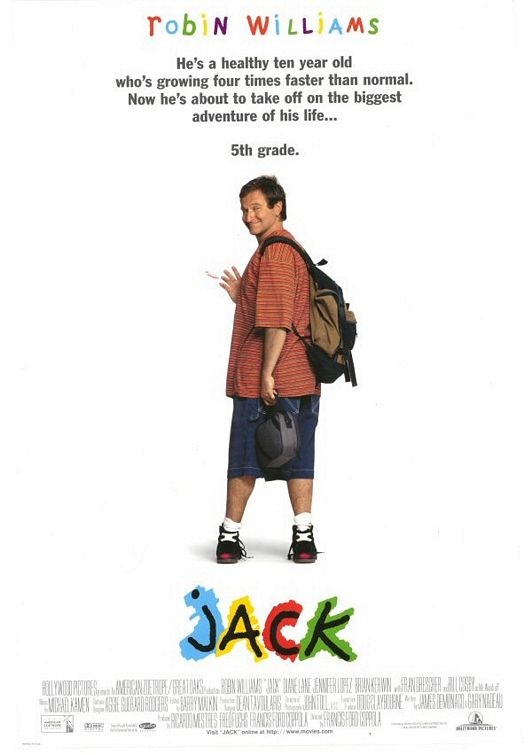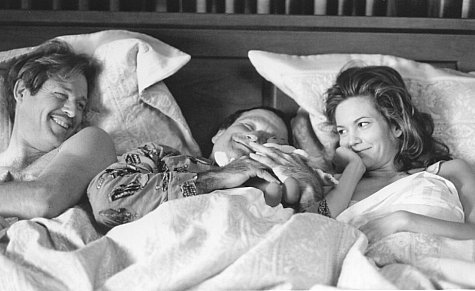 More than The Cotton Club, more than The Godfather Part III, and more even than One from the Heart, the Francis Ford Coppola movie that I was most afraid of seeing for the first time was Jack. I honestly wasn’t sure if I’d be able to find something of value in the movie, a late 90s message-movie about Jack, a boy with Werner syndrome, which means Jack ages at four times the normal rate. Robin Williams plays Jack. And, well, guess what the message is.
More than The Cotton Club, more than The Godfather Part III, and more even than One from the Heart, the Francis Ford Coppola movie that I was most afraid of seeing for the first time was Jack. I honestly wasn’t sure if I’d be able to find something of value in the movie, a late 90s message-movie about Jack, a boy with Werner syndrome, which means Jack ages at four times the normal rate. Robin Williams plays Jack. And, well, guess what the message is.
I’ve spent a lot of this retrospective on Coppola’s career both defending his lesser known work and trying to wrap my mind around his sometime megalomania. The thing that I love the most about Coppola is that no matter what is at stake, he will eventually attempt to turn anything he’s working on into art. By art I mean he works on his films by developing a singular, original vision, bringing to bear all the techniques and tools of filmmaking to achieve that vision. Even when he claims he’s making something “just for money” like the aforementioned One from the Heart, The Cotton Club or The Godfather Part III, he can’t help but at least try to make something that has some level of originality and vision.
That isn’t quite true with Jack. Jack is a hack job. It’s awful. It’s so singularly awful that it’s making me wonder just what it is I consider good to be. I mean, what sin does Jack commit that makes it almost nearly unwatchable? Sure, Robin Williams gives a performance that in its own way goes “full ‘tard.” The screen character he creates in Jack is so thoughtfully done, so layered and well-wrought that he does indeed feel like what he is: an emotionally stunted ten year old in a 40 year old’s body. Like Sean Penn in I Am Sam, William’s performance is perfect, and therefore unwatchable.
But that’s not it.
There’s also the other elementary school kids, who are all written so badly they make Saved by the Bell look like Lil’ Chekhov. Their expository introduction in the first few minutes offers us not a single believable character. Goonies this is not.
But that’s not it.
One might also point to the beginning of the film, where Coppola gives us a “birth canal-cam,” or to Bill Cosby’s “wise black man,” or to Fran Drescher making out with a ten year old, or any number of other things about the movie that fall flat, feel creepy, or bring the cliché when they could have offered the shock of the new.
But those features of the film only make it bad, and bad is not god-awful boring.
Harold Bloom is fond of the famous Oscar Wilde quote “All bad poetry is sincere,” except Oscar Wilde didn’t say that. What Oscar Wilde said was this: “All bad poetry springs from genuine feeling. To be natural is to be obvious, and to be obvious is to be inartistic.” That’s from The Critic as Artist, which I haven’t read since I was an undergrad and probably didn’t understand it even then. But I’m pretty sure it has something to do with why Jack is such a boring a film that it put me into a metabolic coma.
Here’s the thing. Within the first fifteen minutes of the film, you know everything Jack has to say about everything it’s going to talk about. You know the version of America Coppola’s chosen for the story. You know what kids are like, what adults are like, what childhood is like, what school is like, what women and men and life and death and aging and education and love and fear and hope are like. And if I know what a movie thinks of all of those things in the first fifteen minutes, it’s an abject failure, because it completely lacks vision and is, by definition, inartistic.
 Which isn’t to say that a movie must have artistic merit in order to be worthwhile, but if it’s not going to have artistic merit it better be entertaining, and as you must know, Jack isn’t even a little entertaining. Of course, what we all want is a little art in our entertainment, or a little entertainment in our art. Jack provides neither.
Which isn’t to say that a movie must have artistic merit in order to be worthwhile, but if it’s not going to have artistic merit it better be entertaining, and as you must know, Jack isn’t even a little entertaining. Of course, what we all want is a little art in our entertainment, or a little entertainment in our art. Jack provides neither.
Let’s contrast Jack with Apocalypse Now. It may be an unfair comparison, but let’s get specific about why it’s an unfair comparison. The entire meaning of Apocalypse Now cannot be understood until we find out what Martin Sheen’s Willard is going to do when he catches up with Marlon Brando’s Colonel Kurtz. At first we think he might kill Kurtz outright, but immediately when Willard sets out on his epic trip into the heart of Vietnam, what Vietnam means and what Kurtz means begins to shift. Thirty minutes in the nature of Willard’s journey is so wrapped up with the nature of the Vietnam War that we feel as if the final fate of Kurtz will somehow shed light on the war, the United States, the Cold War, the sixties, and the spirit of humanity itself. We’re put into this sense of tension until the last moment of the movie, and it’s a tension based on meaning.
And Jack?
Everything Jack has to say can be gleaned from the first fifteen minutes of the film. Or the trailer. Or the poster. Honestly, the poster pretty much does it. The poster, in fact, is the most fun part of the whole movie. Who’s to blame? Who cares. It’s not a movie you want to watch, even if you’re the biggest Coppola fan on the planet. Believe me.
Next week: Coppola proves he can do mercenary filmmaking well.


